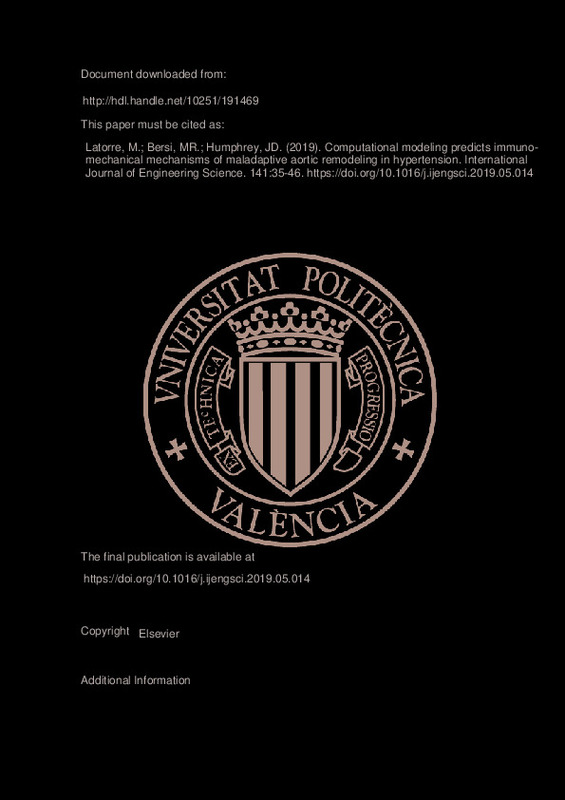JavaScript is disabled for your browser. Some features of this site may not work without it.
Buscar en RiuNet
Listar
Mi cuenta
Estadísticas
Ayuda RiuNet
Admin. UPV
Computational modeling predicts immuno-mechanical mechanisms of maladaptive aortic remodeling in hypertension
Mostrar el registro sencillo del ítem
Ficheros en el ítem
| dc.contributor.author | Latorre, Marcos
|
es_ES |
| dc.contributor.author | Bersi, Matthew R.
|
es_ES |
| dc.contributor.author | Humphrey, Jay D.
|
es_ES |
| dc.date.accessioned | 2023-01-26T19:01:38Z | |
| dc.date.available | 2023-01-26T19:01:38Z | |
| dc.date.issued | 2019-08 | es_ES |
| dc.identifier.issn | 0020-7225 | es_ES |
| dc.identifier.uri | http://hdl.handle.net/10251/191469 | |
| dc.description.abstract | [EN] Uncontrolled hypertension is a major risk factor for myriad cardiovascular diseases. Among its many effects, hypertension increases central artery stiffness which in turn is both an initiator and indicator of disease. Despite extensive clinical, animal, and basic science studies, the biochemomechanical mechanisms by which hypertension drives aortic stiffening remain unclear. In this paper, we show that a new computational model of aortic growth and remodeling can capture differential effects of induced hypertension on the thoracic and abdominal aorta in a common mouse model of disease. Because the simulations treat the aortic wall as a constrained mixture of different constituents having different material properties and rates of turnover, one can gain increased insight into underlying constituent-level mechanisms of aortic remodeling. Model results suggest that the aorta can mechano-adapt locally to blood pressure elevation in the absence of marked inflammation, but large increases in inflammation drive a persistent maladaptive phenotype characterized primarily by adventitial fibrosis. Moreover, this fibrosis appears to occur via a marked increase in the rate of deposition of collagen having different material properties in the absence of a compensatory increase in the rate of matrix degradation. Controlling inflammation thus appears to be key to reducing fibrosis, but therapeutic strategies should not compromise the proteolytic activity of the wall that is essential to mechanical homeostasis. | es_ES |
| dc.description.sponsorship | This work was supported, in part, by grants from the US NIH: R01 HL105297, U01 HL116323, U01 HL142518, and P01 HL134605 | es_ES |
| dc.language | Inglés | es_ES |
| dc.publisher | Elsevier | es_ES |
| dc.relation.ispartof | International Journal of Engineering Science | es_ES |
| dc.rights | Reconocimiento - No comercial - Sin obra derivada (by-nc-nd) | es_ES |
| dc.subject | Wall stress | es_ES |
| dc.subject | Blood pressure | es_ES |
| dc.subject | Aorta | es_ES |
| dc.subject | Constrained mixture | es_ES |
| dc.subject | Inflammation | es_ES |
| dc.title | Computational modeling predicts immuno-mechanical mechanisms of maladaptive aortic remodeling in hypertension | es_ES |
| dc.type | Artículo | es_ES |
| dc.identifier.doi | 10.1016/j.ijengsci.2019.05.014 | es_ES |
| dc.relation.projectID | info:eu-repo/grantAgreement/NIH//R01 HL105297//Mechanisms Underlying the Progression of Arterial Stiffness in Hypertension/ | es_ES |
| dc.relation.projectID | info:eu-repo/grantAgreement/NIH//U01 HL116323//Multiscale, Multiphysics Model of Thrombus Biomechanics in Aortic Dissection/ | es_ES |
| dc.relation.projectID | info:eu-repo/grantAgreement/NIH//U01 HL142518//Multimodality imaging-driven multifidelity modeling of aortic dissection/ | es_ES |
| dc.relation.projectID | info:eu-repo/grantAgreement/NIH//P01 HL134605 //Endothelial Mechanotransduction in Thoracic Aneurysm Formation and Progression/ | es_ES |
| dc.rights.accessRights | Abierto | es_ES |
| dc.description.bibliographicCitation | Latorre, M.; Bersi, MR.; Humphrey, JD. (2019). Computational modeling predicts immuno-mechanical mechanisms of maladaptive aortic remodeling in hypertension. International Journal of Engineering Science. 141:35-46. https://doi.org/10.1016/j.ijengsci.2019.05.014 | es_ES |
| dc.description.accrualMethod | S | es_ES |
| dc.relation.publisherversion | https://doi.org/10.1016/j.ijengsci.2019.05.014 | es_ES |
| dc.description.upvformatpinicio | 35 | es_ES |
| dc.description.upvformatpfin | 46 | es_ES |
| dc.type.version | info:eu-repo/semantics/publishedVersion | es_ES |
| dc.description.volume | 141 | es_ES |
| dc.identifier.pmid | 32831391 | es_ES |
| dc.identifier.pmcid | PMC7437922 | es_ES |
| dc.relation.pasarela | S\472130 | es_ES |
| dc.contributor.funder | National Institutes of Health, EEUU | es_ES |
| dc.subject.ods | 03.- Garantizar una vida saludable y promover el bienestar para todos y todas en todas las edades | es_ES |







![[Cerrado]](/themes/UPV/images/candado.png)

